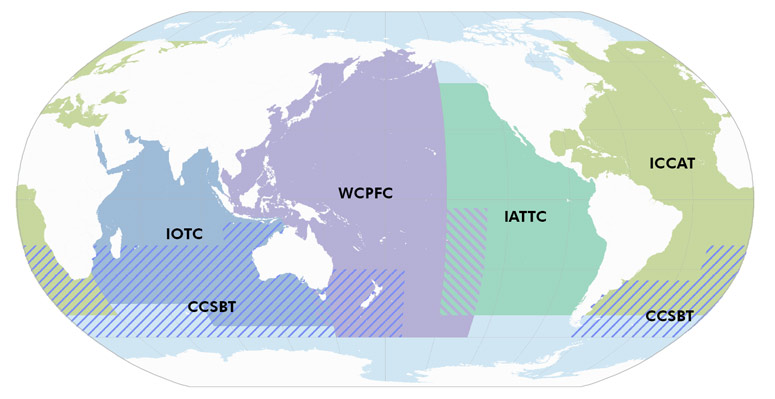Recommendations to Kobe III Joint Tuna RFMO Meeting
 Collectively, the convention areas of the tuna RFMOs (Regional Fisheries Management Organizations) cover over 325 million km2, or 91 percent of the world's ocean surface. Within these areas, over 4 million metric tonnes of tuna are caught annually by tens of thousands of vessels, many of which move from ocean to ocean over the course of a year. The need for coordinated management of these fisheries is clear. This document outlines recommendations from the Pew Environment Group for action needed by all countries involved in fishing in the five tuna RFMOs.
Collectively, the convention areas of the tuna RFMOs (Regional Fisheries Management Organizations) cover over 325 million km2, or 91 percent of the world's ocean surface. Within these areas, over 4 million metric tonnes of tuna are caught annually by tens of thousands of vessels, many of which move from ocean to ocean over the course of a year. The need for coordinated management of these fisheries is clear. This document outlines recommendations from the Pew Environment Group for action needed by all countries involved in fishing in the five tuna RFMOs.
Recommendations
At the Kobe III Joint Tuna RFMO Meeting, the Pew Environment Group calls on tuna RFMO member countries to take coordinated action on the following:
1. Best Practices for Tuna Management
- Improve accountability
- Address overcapacity
- Apply the precautionary principle and establish Total Allowable Catch limits (TACs)
- Improve Fish Aggregating Devices (FADs) management
2. Coordinated Action to Combat Illegal, Unreported and Unregulated (IUU) Fishing
- Adopt Port State Measures (PSMs) in line with Port State Measures Agreement (PSMA)
- Assist developing countries in implementing the PSMA
- Adopt Unique Vessel Identifiers (UVIs)
- Develop a combined IUU vessel list for all the tuna RFMOs
3. Conservation Measures to Protect Sharks
- Accurately assess bycatch and discards
- Immediately adopt precautionary management measures for shark species
- Immediately implement bycatch mitigation methods
- Adopt enforceable measures for finning bans
- Comply with Food and Agriculture Organization's (FAO) International Plan of Action for the Conservation and Management of Sharks (IPOA-Sharks)
- Establish greater cooperation across tuna RFMOs for shark conservation











